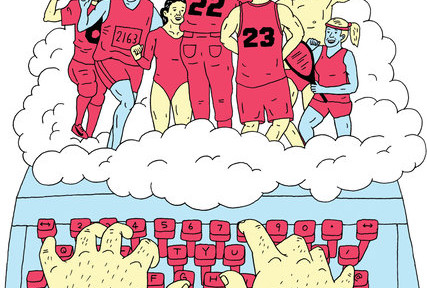Nicholas Dawidoff admires how the very best sportswriters manage to wring meaning out of what is, ultimately, a triviality:
When writing about sports, you have to learn to navigate an odd literary predicament: Your audience often already knows the outcome before it starts reading. An editor at Sports Illustrated once advised me that the art of the work rested in telling people who already know what happened a story so compelling that they forget everything and, at the end, wish they’d been there. Not every writer can chance upon a famous athlete’s last game, as John Updike did for his peerless profile of Ted Williams. We won’t all encounter a young basketball player so committed to developing a sense of where he is on the court that he practices dribbling around lines of chairs with makeshift blinders in eyeglass frames (see John McPhee on Bill Bradley). But this editor helped me to regard sports as a parallel world full of little climaxes and telling details, just waiting for you to make the most of them…
Athletes, after all, are characters to a sportswriter, just as family members must be to a memoirist. You are responsible for them in full, and it’s particularly important to remember what brought you to them in the first place. What writers like Mr. Angell, A. J. Liebling, John McPhee, George Plimpton and the great Red Smith, as well as Sports Illustrated writers like Roy Blount, Robert Creamer, Frank Deford, Dan Jenkins, Ron Fimrite, Steve Wulf and — too many to mention! — share is the essence of good sportswriting: empathy. The appreciation of others is, for most, the reason to watch games, and it happens to be a noble human quality. Where too much recent American literature is less concerned with any search for meaning than the preening desire to be admired, really good sportswriting is grounded in curiosity and revelation, an enthusiast’s notes. And while few authors can compete with the reality, a writer can deepen it, preserve what happened and then mine it for the deeper human qualities at play that are the essence of lasting writing.
Meanwhile, Sebastian Stockman — who whiles away considerable column space on a very strange and only marginally germane tangent regarding the prevalence of Nazi references in sportswriting — bemoans the trade’s overarching lack of a wider societal perspective:
But no, Murray and Deford possess a self-awareness about their professions that Feinstein does not. That is, that the most interesting stuff in the sports world has to do with its stories, not its scores.
I would like to say that all sports fans know that, but we do not. For evidence, I turn to the letters page of the July 30 Sports Illustrated. One C. Fred Bergsten from Annandale, Va. has written in to respond to a book excerpt the magazine ran on that 1992 Dream Team. Here’s the letter:
With all the hype of the 20th anniversary of the Dream Team… most fans are forgetting that there were two squads, the Soviet Union and Yugoslavia, that could have given the Dream Team a run for its money had their countries not dissolved just before the Barcelona Games. The Soviets were the defending gold medalist from the 1988 Games, and Yugoslavia was the ’90 FIBA world champion. It is a tragedy that colossal matchups among the three basketball superpowers never occurred in ’92.
Yes, the tragedy of the Yugoslavian civil war was not Srebrenica, it was that the reigning FIBA champs didn’t get a shot at the Dream Team.
Personally, I harbor a fairly schizophrenic view of sportswriting. On the one hand, much of it — the stuff I tend to read, anyway — represents the worst kind of writing. In fact, one can say there is an almost inverse relationship between what people broadly consider good sportswriting and what they consider good journalism. In good sportswriting, heroes are continually made of men and women who pursue an irrefutably trivial career. In good journalism, even the best characters invariably have their flaws, or else all credibility of the writer is lost. In good sportswriting, the sporting events themselves are made into epic, and epoch-defining, moments in history. In good journalism, even the most classic drama is eventually dissected into digestible, often technical and highly detailed, pieces.
In short, there is a patent ridiculousness to sportswriting, and it is this quality that both draws me in and repulses me simultaneously. A sportswriter is, to me, someone who interprets the adage “the pen is mightier than the sword” as an unqualified exhortation to somehow combine the two. I inwardly mock these journalists’ labored metaphors but, in moments of glory for a team I happen to follow, feel inspired to ascend those very same mountains of linguistic bling bling myself. And in the meantime, I won’t feel guilty about reading them either.
Related articles
- Live chat with sportswriter, novelist Frank Deford (seattletimes.nwsource.com)
- Sportswriter Frank Deford’s book captures a remarkable career (kansascity.com)
- If you like sports (aimlesswithpurpose.wordpress.com)
- You: ‘Over Timer: My Life as a Sportswriter,’ by Frank Deford (washingtonpost.com)
